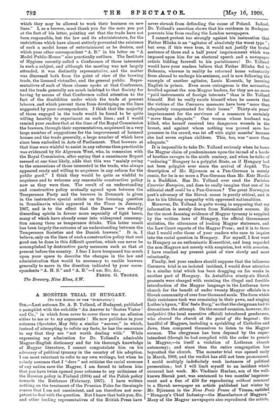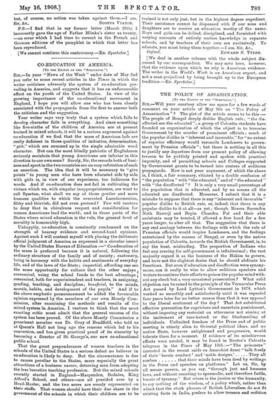A MONSTER TRIAL IN HUNGARY.
(To THE EDITOR OF THZ "SPECTATOR:1
SIR,—Last autumn Dr. A. B. Tolland, of Budapest, published a pamphlet with the sub-title " An Answer to Scotus Yiator ' and Co.," in which from cover to cover there was no allusion either to me or to my arguments ! He now publishes in your columns (Spectator, May 9th) a similar " answer," in which, instead of attempting to refute my facts, he has the assurance to say that they are "not worth dealing with." While expressing my admiration for Dr. Yolland's admirable Magyar-English dictionary and for his thorough knowledge of Magyar literature, I cannot congratulate him on hie advocacy of political tyranny in the country of his adoption. I am most reluctant to refer to my own writings, but when he calmly assumes that I "dare" not criticise the racial excesses of any nation save the Magyar, I am forced to inform him that you have twice opened your columns to my criticisms of the Russian policy in Finland (1904) and of the Polish policy towards the Ruthenes (February, 1907).. I have written nothing on the treatment of the Prussian Poles for the simple reason that I am not omniscient, and am therefore not coin- ' petent to deal with the question. But I know that both you, Sir, and other leading representatives of the British Press have
never shrunk from defending the cause of Poland. Indeed, Dr. Yolland's assertion shows that his residence in Budapest prevents him from reading the London newspapers.
I cannot protest too strongly against his insinuation that Father Hlinka is an "agitator of absolutely the worst type " ; but even if this were true, it would not justify the brutal sentence of three and a half years' imprisonment which was imposed upon him for an electoral speech and a newspaper article bidding farewell to his parishioners ! Dr. Yolland would have your readers believe that Father Hlinka fled to Bohemia., whereas in reality he returned home voluntarily from abroad to undergo his sentence, and is now following the example of another agitator, Louis Kossuth, by learning English in prison. Even more outrageous is the accusation levelled against the non-Magyar leaders, for they are no more "paid instruments of foreign interests" than is Dr. Tolland himself. But he really excels himself when he asserts that the victims of the ,Csernova massacre have been "more than adequately compensated for their losses." Thirty-six years' imprisonment for the survivors of a massacre is certainly " more than adequate." One woman whose husband was killed, who herself received two dangerous wounds in the breast, and against whom nothing was proved save her presence in the crowd, was let off with eight months' because she had seven orphan children. This, too, was "more than adequate."
It is impossible to take Dr. Yolland seriously when be bases the Magyar claim of predominance upon the inroad of a horde of heathen savages in the ninth century, and when he talks of " reducing " Hungary to a polyglot State, as if Hungary had not been polyglot ever since the arrival of firpild. _ The description of Mr. Bjornson as a Pan-German is merely comic, for he is no more a Pan-German than Mr. Keir Hardie is a Buddhist. Has Dr. Yolland ever read the Parisian Courrier Europeen, and does he really imagine that one of its editorial staff could be a Pan-German ? The great Norwegian poet's advocacy of the Slovak- cause is- purely ethical, and is due to his lifelong sympathy with oppressed nationalities.
Moreover, Dr. Tolland is quite wrong in supposing that my information is merely drawn from Nationalist sources. By far the most damning evidence of Magyar tyranny is supplied by the written laws of Hungary, the official Government statistics, the utterances of leading Magyar statesmen, and the Law Court reports of the Magyar Press ; and it is to these that I would refer those of your readers who care to inquire into the racial question in Hungary. For myself, .I first went to Hungary as an enthusiastic Kossuthist, and long regarded the non-Magyars not merely with suspicion, but with aversion. I have reached my present point of view slowly and most reluctantly.
Finally, lest your readers should suppose that the infamous Csernova trial is an isolated incident, I would draw attention to a similar trial which has been dragging on for weeks in another part of Hungary. In Antalfalva ninety-six Slovak peasants were charged with resisting. the illegal and forcible introduction of the Magyar language in the Lutheran town church for the benefit of under twenty Magyar officials in a Slovak community of over four thousand souls. The form which their resistance took was remaining in their pews, and singing Luther's hymn, " Ein' feste Burg," so that the clergyman had to discontinue the attempt. On the second occasion, however, the szolgabiro (the local executive official) introduced gendarmes, who cleared the church at the point of the bayonet : the 'handful of Magyars, including a sprinkling of Catholics and Jews, then composed themselves to listen to the Magyar sermon. The clergyman has been deposed by the super- intendent (though he had complied with the order to preach in Magyar,—in itself a violation of Lutheran church autonomy) ; and since then the entire congregation has boycotted the church. The monster trial was opened early in March, 1908, and the verdict has still not been pronounced. I could multiply indefinitely such instances of political persecution ; but I will limit myself to an incident which occurred last weeks Mr. Vladimir Hurban, son of the well- known Slovak poet, was sentenced to two months' imprison- ment and a fine of 250 for reproducing without comment in a Slovak newspaper an article published last winter by -Mr: Bjornson in the Neue Freie Presse of Vienna, entitled " Hungary's Chief Industrythe Manufacture of Magyars." Many of the Magyar newspapers also reproduced the article, but, of course, no action was taken against them.—I am, P.S.—I find that in any former letter (March 28th) I incorrectly gave the age of Father Hlinka's sister as twenty, —an error which I had time to correct in the French and German editions of the pamphlet in which that letter has been reproduced.
[We cannot continue this controversy.—En. Spectator.]















































 Previous page
Previous page